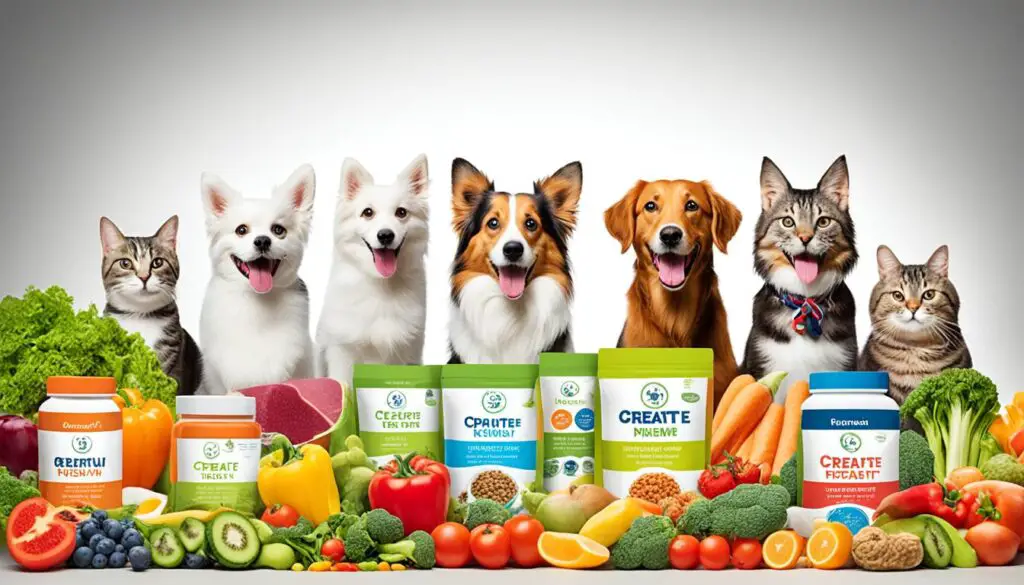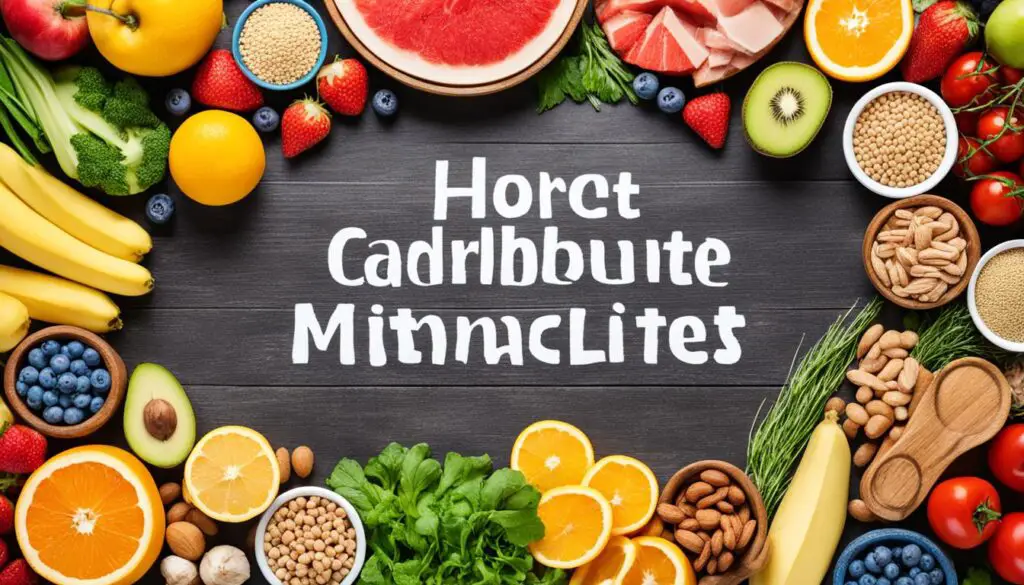Being a dog parent means wanting the best for our furry family members. Proper nutrition plays a huge role in their happiness and health. Dogs, like people, need a diet full of essential nutrients for their growth and well-being.
In this article, you’ll learn key tips for keeping your pet’s diet on track. This way, they can enjoy a vibrant, energetic life full of playful days.
Key Takeaways:
- Water, fat, protein, carbs, vitamins, and minerals are essential nutrients for dogs.
- Water is crucial for hydration and nutrient transport.
- Fat provides energy and supports bodily functions.
- Protein helps with structure and muscle development.
- Carbs, vitamins, and minerals play vital roles in growth and overall health.
The Importance of Water, Fat, and Protein in Your Pet’s Diet
Three essential nutrients are crucial for your pet’s health: water, fat, and protein. Each plays a vital role in their well-being.
Importance of Water: Water is essential for life. It’s especially important for dogs, making up a large part of their body. It helps with nutrient transport, temperature control, and waste removal. So, it’s crucial for pet owners to give their pets constant access to fresh water. This keeps them hydrated and healthy.
Importance of Fat: Fat is a key part of your pet’s diet. It provides energy, keeps them warm, and protects their organs. Fat is also needed for a healthy brain and immune system. Pets need fats like omega-3 and omega-6 because they can’t make them. These fats help with skin and coat health, brain growth, and protection against illnesses.
Importance of Protein: Protein is critical for energy, muscle development, and body structure. Dogs depend on it for their health. But they can’t make all the amino acids they need. They get protein from foods like meat, fish, and poultry. This supports their energy levels, strength, and overall health.
A diet with the right amounts of water, fats, and protein is vital for your pet. Every pet is different, so talk to your vet about their specific needs. This way, you can keep your pet healthy and happy.
Understanding Carbohydrates, Vitamins, and Minerals for a Balanced Diet
Carbohydrates, vitamins, and minerals are key for your pet’s health. Though dogs don’t need carbs, they provide energy. This helps keep pets active.
Carbs help the brain work well and support digestive health. They also make pets feel full. Adding carbs to their diet ensures they stay energetic.
“Including vitamins and minerals in your pet’s diet is essential for their overall health and vitality.”
Vitamins support many body functions. They help release energy from food, protect against damage from free radicals, and help bones grow. A mix of nutrient-rich foods offers the vitamins your pet needs.
“Minerals play crucial roles in metabolic processes that keep your pet’s body functioning properly.”
Minerals are key for health too. They help with oxygen transport, muscle moves, and bone builds. Foods high in calcium, phosphorus, and iron keep pets healthy.
To create the best diet, mix carbs, vitamins, and minerals. Understanding these nutrients helps you plan meals. This ensures a balanced diet for your pet.
Sample Table: Nutrient-Rich Foods
| Nutrient | Food Sources |
|---|---|
| Carbohydrates | Oats, sweet potatoes, brown rice |
| Vitamins | Fruits, vegetables, organ meats |
| Minerals | Salmon, leafy green vegetables, eggs |
Conclusion
Providing your beloved pet with a balanced diet is key to their health. It’s important to know about nutrients like water, fat, protein, carbs, vitamins, and minerals. This helps me choose the best food for my pet. By picking quality food and getting advice from my vet, I meet my pet’s dietary needs.
A nutritious diet is just one part of a pet’s healthy life. Exercise, brain games, and seeing the vet regularly are crucial too. Activities like walking, playing, and using interactive toys keep them fit and happy. Also, vet visits help catch and treat any health issues early.
I make sure my pet eats well, stays active, and gets proper care. This gives them a great chance at a lively, joyful life. When I see my pet energetic and happy, it fills me with happiness. As their owner, it’s my job to make sure they have everything for a thriving life.
FAQ
Are all of the essential nutrients equally important for my dog’s diet?
Absolutely, every essential nutrient plays a vital role in your dog’s health. They help with different body functions. It’s important for your dog’s regular diet.
How can I ensure that my dog’s diet includes all the essential nutrients?
Choose top-quality dog food that meets nutritional guidelines. Read labels to check for water, fat, protein, carbs, vitamins, and minerals. This ensures a balanced diet for your pet.
Can I provide the essential nutrients through homemade meals for my pet?
Making homemade meals can offer the needed nutrients, but it’s tricky. You must hit the right nutrient balance. Consulting a vet or an animal nutrition expert is key when planning homemade meals.
How much water should I give my dog?
Water needs depend on your dog’s size, how active they are, and the climate. Usually, a dog needs about one ounce of water for every pound they weigh daily. Always check with your vet for exact amounts.
Are there any specific vitamins and minerals that are essential for my dog’s health?
Yes, certain vitamins and minerals are critical for health. These include vitamin A, D, E, B vitamins, calcium, phosphorus, potassium, iron, and zinc. Make sure these are in your pet’s meals.



